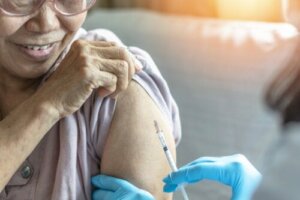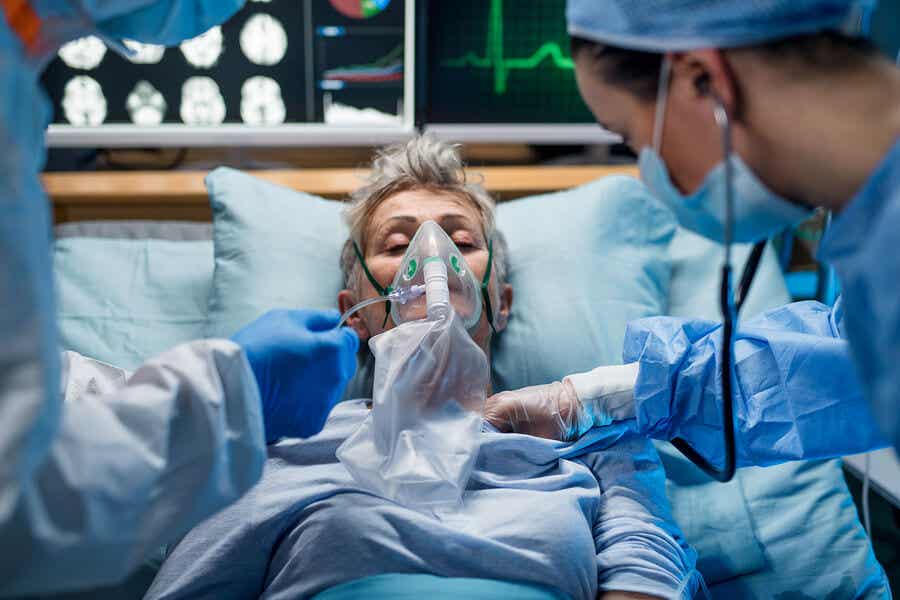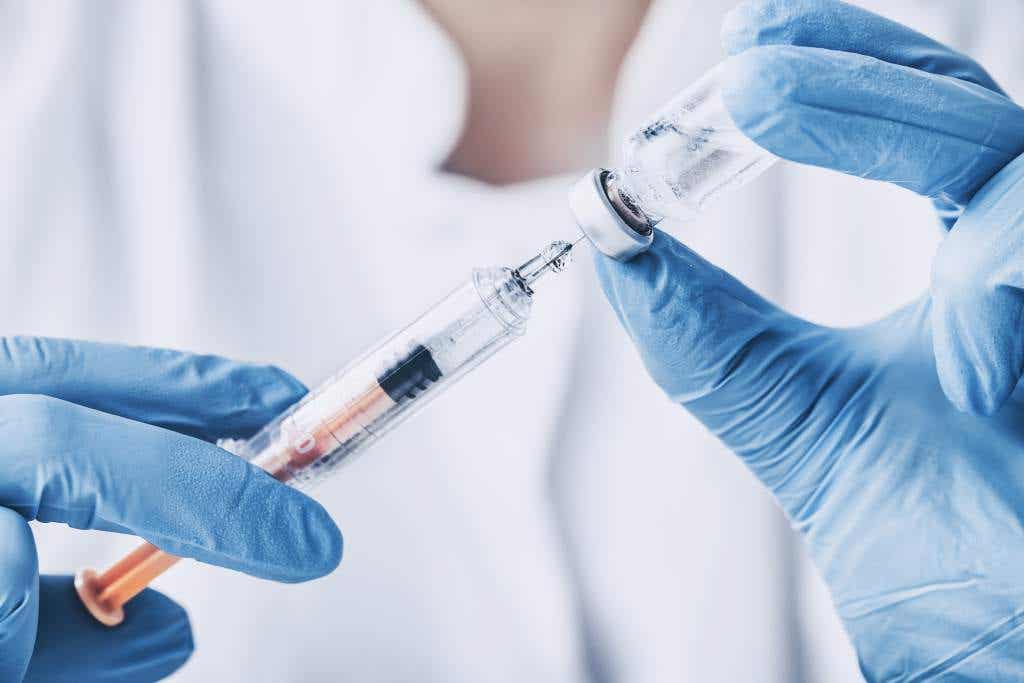Studies Show Efficacy of Pneumonia Vaccine in Older Adults


Written and verified by the doctor Leonardo Biolatto
The pneumonia vaccine (or pneumococcal vaccine) was first licensed in 1977. Pneumonia is a common lung infection that affects millions of people worldwide each year.
The most common bacterium causing pneumonia is pneumococcus (Streptococcus pneumoniae). It’s a microorganism that is spread through person-to-person contact. Although most of the infections it causes are mild, it can also cause very serious cases, especially in the elderly and children.
So much so that, in addition to pneumonia, it can lead to sepsis and meningitis. Therefore, in this article, we’ll explain the importance of the pneumonia vaccine and its efficacy and safety.
What is the pneumonia vaccine?
Pneumonia is a lung infection. What happens is that the alveoli (the small sacs in which gas exchange takes place in the lung) fill with fluid or pus. This is why the person can’t breathe properly. It usually causes a cough, fever and general malaise, among other symptoms. The problem is that this condition can become severely complicated, sometimes even lethal.
According to a publication by the Centers for Disease Control and Prevention, almost 50,000 people die annually from pneumonia in the United States alone. In addition, about one million receive medical care for this health issue.
Certain groups of people are at higher risk for pneumonia or a more severe form of pneumonia. First and foremost are adults over the age of 65 and children under the age of 5.
Those with chronic diseases, such as diabetes or high blood pressure, are another risk group. The same applies to immunocompromised persons. Smokers are also more at risk, as their lungs are vulnerable.

Types of vaccines
As noted above, the first pneumonia vaccine was licensed in 1977. Since then, specialists have developed and refined the method of vaccination. Today, two different versions are used, both of which are safe and effective.
The first is the pneumococcal polysaccharide vaccine (PPSV23). It protects against 23 types of bacteria that cause pneumococcal disease (it’s estimated that there are about 90 strains in total). It’s recommended for people over 65 years of age and for smokers.
The second vaccine is the pneumococcal conjugate vaccine (PCV13). It provides protection against 13 types of bacteria. It’s administered systematically according to the vaccination schedule to children aged 2, 4, and 6 months, and also between 12 and 15 months. Doctors also apply it in people with cochlear implants and cerebrospinal fluid leaks (if over 65 years of age).
Effectiveness of the pneumonia vaccine
The pneumonia vaccine, regardless of type, is considered effective and safe. There’s a great deal of research on this subject. A study published in the International Journal of Epidemiology explains that the pneumococcal polysaccharide vaccine (PPV23) is more effective in younger adults.
In fact, it appears that this efficacy decreases slightly over time. Nevertheless, both types have been very successful in reducing the number of deaths. They have also reduced complications.
As an article from the American Academy of Family Physicians explains, the use of the pneumococcal conjugate vaccine (PCV13) in children has reduced the incidence among adults as well.
In fact, by 2013, the incidence of invasive pneumococcal disease had decreased by about 50% in older adults. For this reason, vaccines are considered to have been a major breakthrough in the prevention of this issue.
Side effects and safety
Serious side effects are very rare. Therefore, the benefit/risk balance is clear.
Pneumococcal conjugate vaccine (PCV13) may cause discomfort at the injection site. For example, redness, swelling, and pain. It happens in both children and adults. Nurses usually give the vaccine in the arm and that’s where the discomfort occurs.
In some cases, the patient presents fever, tiredness, and general malaise. This includes poor appetite and headaches. In children, the fever is usually milder, but they’re more at risk of seizures from the fever.
On the other hand, the polysaccharide type vaccine (PPSV23) can also produce these effects. Doctors associate it with a higher frequency of generalized muscle pain. However, in any case, the symptom is self-limiting.
You may like: What Is Atypical Pneumonia?
When is the vaccine recommended?
There are certain groups of people who are more vulnerable to pneumococcus. That’s why doctors give it to people over 65 years of age as well as to children under 5 years of age.
It’s also prescribed in immunocompromised persons or in those with chronic diseases (diabetics, asthmatics, cardiac patients). Smokers are another risk group that should get this vaccine.
As an article in Vaccines explains, each immunization has its own indications. Specialists usually indicate Pneumococcal conjugate (PCV13) in the following cases:
- Children under 2 years of age. Doctors administer in four different doses at 2, 4, and 6 months of age.
- Children older than 2 years who have certain health issues.
In the case of adults over 65 years of age, the choice is complex. In general, doctors prefer polysaccharides. What you must keep in mind is that neither of the two should be administered if there’s already been an allergic reaction to either of them. Pregnant women shouldn’t get it either.

Other indications for the vaccine
Doctors currently recommend the vaccine when traveling to certain places. Specifically, when traveling to Asia, Africa, and South America. These are places where there’s a high prevalence of the bacterium. A typical example is Saudi Arabia.
Keep reading: Natural Remedies for Detoxifying Your Lungs
The pneumonia vaccine is safe and effective.
Both types of pneumonia vaccine are safe and effective. There may be side effects, but these are mild and self-limiting. For example, pain at the injection site or slight malaise.
Doctors, therefore, recommend that at-risk groups be vaccinated. The benefit significantly outweighs the risk. In addition, the percentage of infections, deaths, and complications has decreased.
However, in addition to vaccination, it’s important to take into account certain measures to try to prevent infection. You should perform proper hand hygiene frequently. You must also clean surfaces that people often touch.
When sneezing or coughing, you should cover your nose and mouth with the inside of the elbow or a disposable handkerchief. Similarly, it’s essential to stop smoking or limit contact with smokers as much as possible. Lastly, in the event of any symptoms or suspicion of illness, it’s essential to always consult a doctor.
All cited sources were thoroughly reviewed by our team to ensure their quality, reliability, currency, and validity. The bibliography of this article was considered reliable and of academic or scientific accuracy.
- Neumocócica | Vacunas. (n.d.). Retrieved April 15, 2021, from https://www.vaccines.gov/diseases/pneumonia
- Vacuna contra el neumococo. (n.d.). Retrieved April 15, 2021, from https://www.aafp.org/family-physician/patient-care/prevention-wellness/immunizations-vaccines/disease-pop-immunization/pneumococcus-vaccine.html
- Patógenos | Texto completo gratis | Una revisión sistemática de los estudios publicados entre 2016 y 2019 sobre la efectividad y la eficacia de la vacunación antineumocócica en la neumonía y la enfermedad neumocócica invasiva en una población anciana | HTML. (n.d.). Retrieved April 15, 2021, from https://www.mdpi.com/2076-0817/9/4/259/htm
- La neumonía puede prevenirse: Las vacunas pueden ayudar | CDC. (n.d.). Retrieved April 15, 2021, from https://www.cdc.gov/pneumonia/prevention-sp.html
- Nemirovsky, Corina. “Vacuna conjugada polisacárida contra la neumonía neumoccocica en adultos.” Evidencia, actualizacion en la práctica ambulatoria 20.1 (2017).
- Blanco, AI Aller, and M. Monclús López. “¿ Es efectiva la vacunación antineumocócica para evitar la enfermedad por neumococo en adultos inmunodeprimidos?.” Vacunas 20.2 (2019): 60-65.
This text is provided for informational purposes only and does not replace consultation with a professional. If in doubt, consult your specialist.








